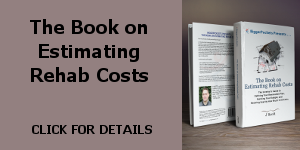The Ticket House has been sold…and I’ve more than recoup the cost of the speeding ticket I received while pulling into the subdivision to view the house for the first time… 🙂
This was an easy project and a great experiment for us. First, it was outside of our typical purchase area (about 30 minutes from home), so the logistics of getting the rehab done and getting it sold was a little tougher than usual. Second, it was priced a bit higher ($145,000) than our typical houses, so we were targeting a different demographic of buyer and were dealing with new buyer’s agents who we didn’t know. Overall, the results were fantastic, and this was a very profitable project. My wife deserves much of the credit, as she was the one pushing for us to do this project.
The nicest surprise was that we only needed one appraisal (despite the buyer getting an FHA loan), and that appraisal came in several thousand dollars above our contract price. So, for the first time in a while, we didn’t have to deal with potentially low appraisals. We did waste some time on the first buyer who had the property under contract, and we decided to lower the price after that contract fell through, but we quickly found a new buyer at the new full-price.
Here is the full final analysis for this one…
Timelines
Here are the key timeline milestones:
- Purchase Offer Date: 1/12/2012
- Purchase Closing Date: 1/30/2012
- Rehab Completion Date: 2/21/2012
- Sale Listing Date: 2/22/2012
- First Sale Contract Date: 3/20/2012
- Final Sale Contract Date: 4/18/2012
- Sale Closing Date: 5/31/2012
Financials
Here is the breakdown of financials for this project:

Final Statistics
Here are just some of the final statistics that I’ve been tracking for all my projects, and that summarize the success/failure of each project pretty well:
- From Offer to Purchase Time: 18 Days
- Rehab Time: 20 Days
- Selling Days on Market: 56 Days
- Selling Close Time: 43 Days
- Total Hold Time (Close to Close): 122 Days
- Total Profit: $34,026.28
- Return on Investment (ROI): 33.59%
- Annualized ROI: 100.48%




I would love to see your ideas on flipping homes in the Washington DC area
Congrats on another profitable sale! I was waiting to see what the numbers were on this one. It’s interesting to me that your sale price was $145K but the rehab materials used were similar to other props you’ve sold in the lower price ranges. If I remember correctly, the Ticket House has painted kitchen cupboards, and the counters are your standard formica. What’s your take on the relatively easy sale at your asking price? Was it the desirability of the neighborhood? Does the house have a better architecture or layout? That was the same amount of work for a significantly better profit. Always like to hear more about that!
I live in the Atlanta area (Dacula, Hamilton Mill) and really enjoy your blog. I just made a complete career change by getting my real estate license, becoming an agent with Keller Williams, and am excited to pursue my dream of flipping homes.
In fact, I’m attending my first “Investor’s Committee Meeting” at Keller Williams on Wednesday with a few agents who work specifically in the area of investing.
I’m so impressed with your success and your blog is incredibly comprehensive.
Congrats Beth! Perhaps we’ll have an opportunity to work together in some capacity at some point…give me a call if you’re ever near Cobb County…
Hi Kristine,
This was the first property (The Puzzle House being the second) that we did outside of our typical area. This one was about 30 minutes north of our usual flipping area, and the schools are significantly better; the house is actually identical to another house that an investor friend of ours did in our typical area and sold for $107,000. So, that extra $40K or so in resale value is directly attributable to the nicer area and better schools. We’d love to do more projects up there in the future and are targeting some houses there now…
Hi Tony,
I know a lot of investors who rehab in the Baltimore/Washington/VA area, and while there’s a lot of competition up there, there are also some great deals!
Well done once again. I am glad to see that you find success in a different area. I have done the same over the last year and although it’s harder to find properties, once I find them they are easier to sell. They are also at a higher price point, in the $150k to $200k range. Do you think it is the price point that makes a difference or the area?
Hey Luis,
I think it’s both the price point and the area. The price point is important because there is more room for profit to begin with — lower priced properties just don’t offer much upside potential, even when they are bought very cheaply. In terms of location, there are a couple benefits: 1. The demographic of buyer is such that they tend to have more cash available, so there is less concern about the ability to get financing and keep it; and 2. In the nicer areas, there are generally fewer appraisal issues, so if we can get a house under contract for a higher price, we can often sell it at (or near) that price.
Of course, these nicer areas with higher margins also have more competition, so it’s harder to get these deals — I imagine you’re in the same situation where you’re buying…
J,
I notice that you put your commission to agents under selling costs, but then credit your side of the commission back under commission costs. Is there a reason for doing it that way? Do you (or your wife) have to charge yourself commission in the first place?, why not just charge 0% on the selling side?
Thanks!
Hey Mike,
Funny, you’re the second person today to ask me that question. For flips/rehabs, whether we charge a commission and pay it back to ourselves or not makes absolutely no financial difference — the only reason I choose to do it is for accounting purposes. By doing this, I can look back at the end of the year and easily calculate how much I’ve saved in commissions by not having to use another agent. But, like I said, it’s just an accounting decision and makes no financial difference.
That said, if I (or anyone) were to be selling a rental property instead of a flip/rehab, the better way to do it is to not pay any commission. The reason is that commission is taxed as ordinary income, but the proceeds of the rental sale would likely be taxed at long-term capital gains rates, which is likely lower than ordinary income. So, when selling a rental, you’d actually save money by not paying commission and just considering that money extra profit on the sale.
I hope that made sense… 🙂
Hi J,
What area of Atlanta was this? I know you usually work the Marietta area.
Congrats on the successful experiment!
Hey Jeff,
This was Kennesaw, just outside of Marietta…
Hey J – love the blog. Can you provide some high level details on the rehab costs? Flooring? Countertops/cabinets, etc?
Thanks!
Rob
Hey Rob,
I generally do a detailed post for each house on both estimated (before the project starts) and final (after everything is done) rehab costs. Here is the final budget post for this house:
http://www.123flip.com/house-29-budget-recap